Get the latest financial news, insights and expert analysis from our award-winning MoneyWeek team, to help you understand what really matters when it comes to your finances.
You are now subscribed
Your newsletter sign-up was successful
Want to add more newsletters?

Twice daily
MoneyWeek
Get the latest financial news, insights and expert analysis from our award-winning MoneyWeek team, to help you understand what really matters when it comes to your finances.

Four times a week
Look After My Bills
Sign up to our free money-saving newsletter, filled with the latest news and expert advice to help you find the best tips and deals for managing your bills. Start saving today!
Primary equity bear markets to which we are now condemned, commenced from levels where prices were much too high and won't end until prices are much too low. Any premature expectation that the primary bear markets have ended is no more than a false dawn. De-leveraging, the unavoidable consequence of the credit contraction, is far from finished and will continue to create a never ending stream of forced sellers. Major stock markets should fall by as much as another 50%; in which case, FTSE will bottom out below 2,500. As unlikely as that may seem to some, it is no more than should be expected given the unprecedented conditions and the abiding lessons of history.
In order to keep our thinking straight, we need to decide upon what sort of journey we are embarked. It is given that a global recession is underway - however, does that properly describe these conditions? No!
All along we have warned that this economic contraction would be the worst in living memory, so let's give it a proper name and call it a 'Depression' because that's exactly what we think it is. To help in making that decision, we referred to Campbell R Harvey's Hypertextual Finance Glossary which defines the meanings of 8,000 different words and acronyms. The definition of 'depression' is succinct, "a period when excess aggregate supply overwhelms aggregate demand, resulting in falling prices, unemployment problems and economic contraction". Well that's it, isn't it? What's going on now ticks all the boxes for a depression.
MoneyWeek
Subscribe to MoneyWeek today and get your first six magazine issues absolutely FREE

Sign up to Money Morning
Don't miss the latest investment and personal finances news, market analysis, plus money-saving tips with our free twice-daily newsletter
Don't miss the latest investment and personal finances news, market analysis, plus money-saving tips with our free twice-daily newsletter
Bearing in mind China's immense manufacturing capacity, excess aggregate supply has probably never been greater. Demand has unquestionably suffered from 'fall off a cliff syndrome'. Across the world, consumers are embarked upon a supersonic flight to frugality. In households everywhere austerity rules, not so much by choice but by necessity.
Prices are unquestionably falling, with innumerable headlines that also warn of deflation. The latest data includes a number of such news items, many of them the lowest figures since record began and similar.
Marks and Spencer are desperately planning a series of '20% off' sales days, they are trying to squeeze what little pre-Christmas trade there is out of reluctant consumers 'discretionary spending RIP'! Not surprisingly, only those retailers who specialise in selling the cheapest goods are doing ok, such as Wal-Mart and Primark.
There's as much evidence as anybody could wish for, to prove that unemployment is rising. In America the long-term jobless are at a 25-year high and very recently Citi announced job cuts of 52,000. It is our view that unemployment is going to hit record levels and will accelerate dramatically because economic activity is infected by 'fall off a cliff syndrome'.
John Thain, Chief Executive Officer of Merrill Lynch, recently said "The global economy was entering a slowdown of epic proportions, comparable to the period after the 1929 crash" - that was called The Great Depression.
Two weeks ago we reported that we had sold the residual holdings of the SocGen Bear Note and had negotiated a new bear note with the Royal Bank of Scotland. It was purchased on 6th November. We said that FTSE was at a technical resistance level and probably was where the next sell-off would start that proved to be spot on. The initial investment was 10% of the model portfolio. We bought that first tranche at £100, the latest price is £117 - so far, so good.
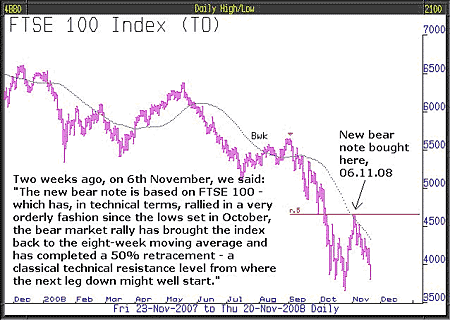
It is our intention to invest a further 7.5% of the model portfolio in the bear note. That decision was triggered by one of our four financial horses of the Apocalypse longer term readers will remember that for a long time, under that title, there were four charts we regularly published to signal when this bear market was going to resume. One of those charts was Dow Theory. Dow Theory says that if the Industrials and the Transports confirm the upside or the downside it represents an important signal for both the economy and the stock market. Today Thursday [20 November], the Industrials closed below 7883, we have the next Dow Theory bear market signal.
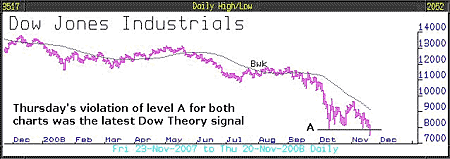
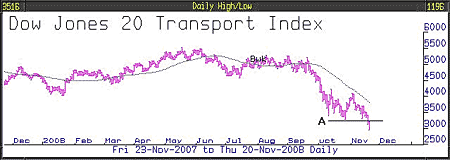
Stock markets won't be able to withstand the pounding they will get over the next few days and weeks as economic conditions continue to deteriorate in an alarming way.
In the conclusion of issue number 575, we published a long-term chart from 1991 of the UK's bank sector. We explained that all that had happened, in spite of a steep fall of about 50%, was that a long-term top had completed and that the real downside started from there. We also said, in issue 575, that it might fall to the 1991 lows. From the most recent chart you can see just how far it has since fallen.
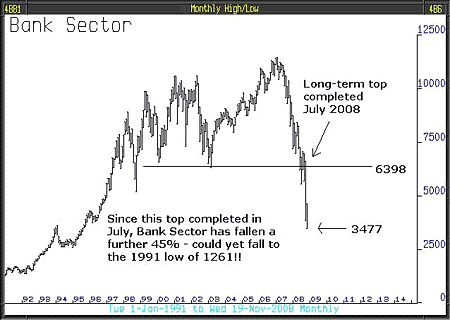
In Ireland the banking crisis is alive and well, the authorities scramble to shore the banks up. You will remember that some weeks ago the Irish government provided a blanket guarantee for depositors. In spite of that guarantee, share prices have continued to collapse. Now the worry is that it's the quality of the country's credit rating that is the problem. Michael Klawitter of Dresdner Kleinwort has said "The markets have begun to see a risk to the solvency of the Irish government. They are questioning whether it has the financial muscle to back up the guarantees". Our opinion is that they haven't.
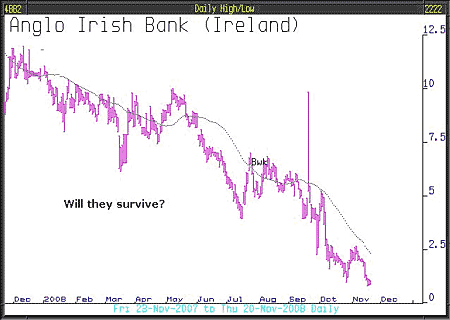
Whilst the 'fall of a cliff syndrome' epidemic continues, there can be no good news other than eventually, no matter how bad it gets, it will end, and after it ends, it will get better. We suspect that prematurely buying stock market investments might prove to be very painful. Warren Buffett's recent announcement that he thought now was the time to buy because in ten years time the prices would be much higher than now, has been treated with some disdain by investors. His investment vehicle, Berkshire Hathaway, has seen its share price fall 40% since September!
Needless to say, the recent stock market action is very positive for the bear note investment and encourages us to believe that this next six-month period ending 30th March should be quite excellent for the model portfolio.
The next big stock market story is going to be fourth quarter earnings, which are set, the Financial Times says, to be dire.
By John Robson & Andrew Selsby at Full Circle Asset Management, as published in the threesixty Newsletter.
Get the latest financial news, insights and expert analysis from our award-winning MoneyWeek team, to help you understand what really matters when it comes to your finances.
MoneyWeek is written by a team of experienced and award-winning journalists, plus expert columnists. As well as daily digital news and features, MoneyWeek also publishes a weekly magazine, covering investing and personal finance. From share tips, pensions, gold to practical investment tips - we provide a round-up to help you make money and keep it.
-
 Should you buy an active ETF?
Should you buy an active ETF?ETFs are often mischaracterised as passive products, but they can be a convenient way to add active management to your portfolio
-
 Power up your pension before 5 April – easy ways to save before the tax year end
Power up your pension before 5 April – easy ways to save before the tax year endWith the end of the tax year looming, pension savers currently have a window to review and maximise what’s going into their retirement funds – we look at how

